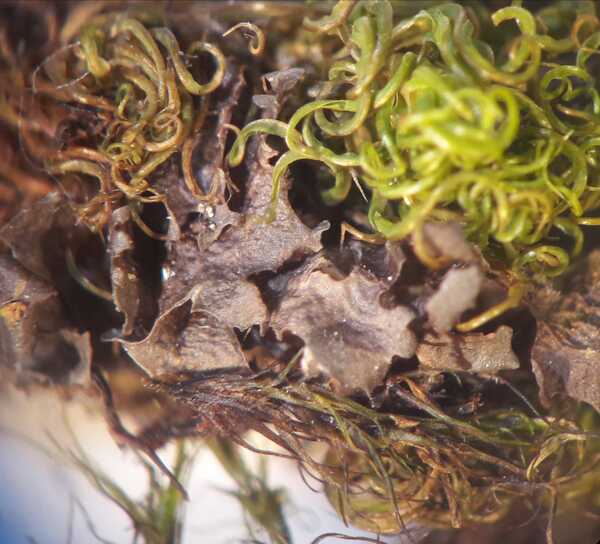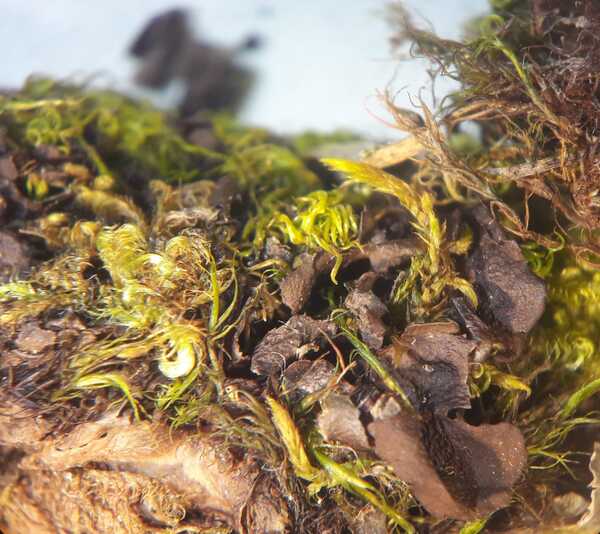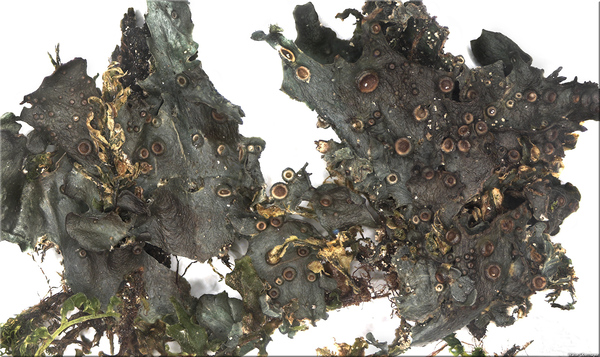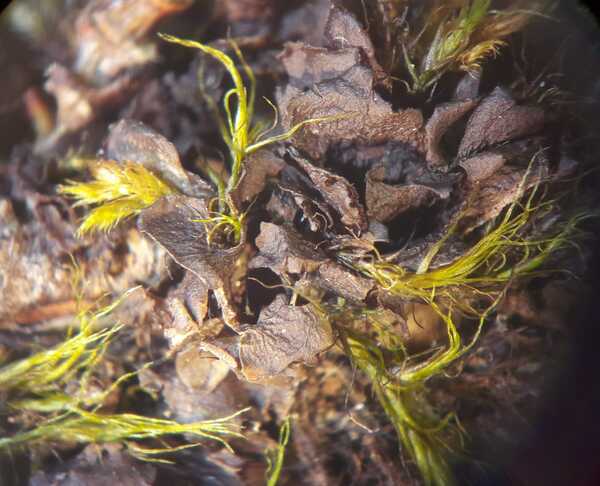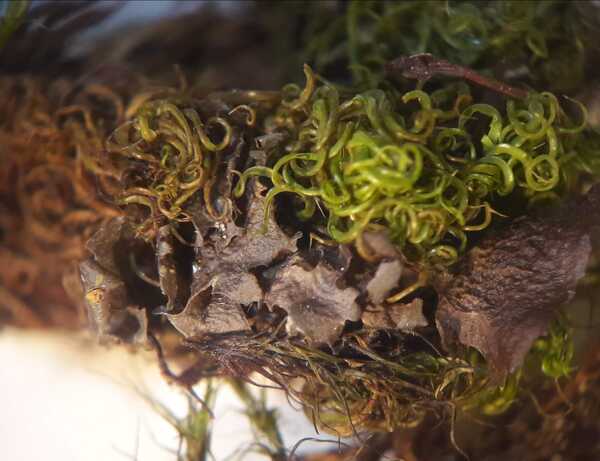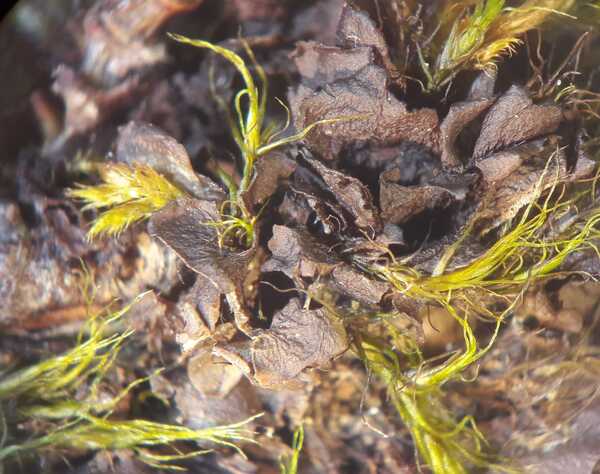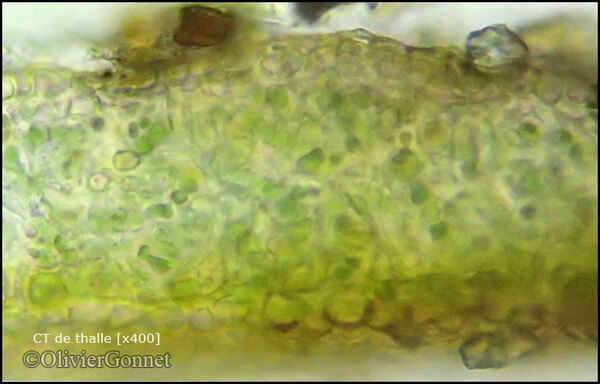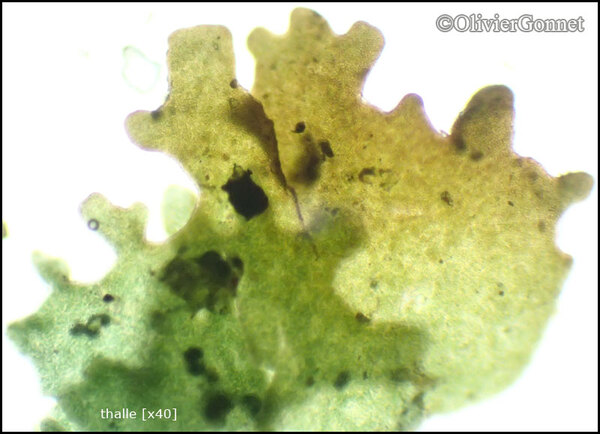Scytinium aragonii (Otálora) Otálora, P.M. Jørg. & Wedin
Fungal Divers., 64, 1: 290, 2013. Basionym: Leptogium aragonii Otálora in Otálora & al. - Taxon, 57: 915, 2008.
Synonyms:
Distribution: N - VG, Ven (Nascimbene & al. 2021), Piem (Otálora & al. 2008), Lig (Giordani & al. 2025). C - Tosc (Otálora & al. 2008). S - Si (B 60 0113703).
Description: Thallus subfoliose to squamulose, slightly gelatinous when wet, forming 3-8 cm wide patches, the lobes flattened, slightly undulating over the substrate, 2-7 mm wide, 54-115 µm thick, with entire to poorly lacerate margins. Upper surface with a few ridges to wrinkled, greenish grey to brown, always matt; lower surface with a few, thin, simple hairs towards the base of lobes. Upper and lower pseudocortex poorly developed, consisting of a single layer of irregularly isodiametrical cells, the layer inbetween with loosely interwoven chains of Nostoc and hyphae. Apothecia rather rare and sparse, lecanorine, laminal to marginal, sessile, 0.3-0.8 mm across, with a brown, concave disc and an entire to lobulate thalline margin. Thalline exciple pseudocorticate; proper exciple paraplectenchymatous, 10-12 µm wide laterally; epithecium brownish; hymenium colourless, 180-220 µm high, I+ blue; paraphyses mostly simple, 1-1.5 µm thick at mid-level, the apical cells slightly swollen; hypothecium yellowish to pale orange, 30-55 µm high. Asci 8-spored, cylindrical-clavate, the apex strongly thickened, the apical dome K/I+ pale blue, with a downwardly projecting K/I+ deep blue tubular structure. Ascospores submuriform to muriform, hyaline, ellipsoid, (29-)33-43(-52) x (11-)13-17(-19) μm. Photobiont cyanobacterial (Nostoc, the cells in chains). Spot test: all negative. Chemistry: without lichen substances. Note: widely distributed throughout Europe, occurring in preserved forests from 200 m in northern regions to 1800 m in the southern part of Europe, on pleurocarpous mosses close to the base of trunks, and over mossy walls or calcareous rocks within forests. Often confused with S. gelatinosum, and to be looked for further throughout Italy. The specimens in B, originally labelled as Leptogium lichenoides, were identified by M. G. Otálora.
Growth form: Squamulose
Substrata: soil, terricolous mosses, and plant debris
Photobiont: cyanobacteria, filamentous (e.g. Nostoc, Scytonema)
Reproductive strategy: mainly sexual
Commonnes-rarity: (info)
Alpine belt: absent
Subalpine belt: absent
Oromediterranean belt: absent
Montane belt: very rare
Submediterranean belt: rare
Padanian area: absent
Humid submediterranean belt: rather common
Humid mediterranean belt: rather rare
Dry mediterranean belt: extremely rare

Predictive model
Herbarium samples
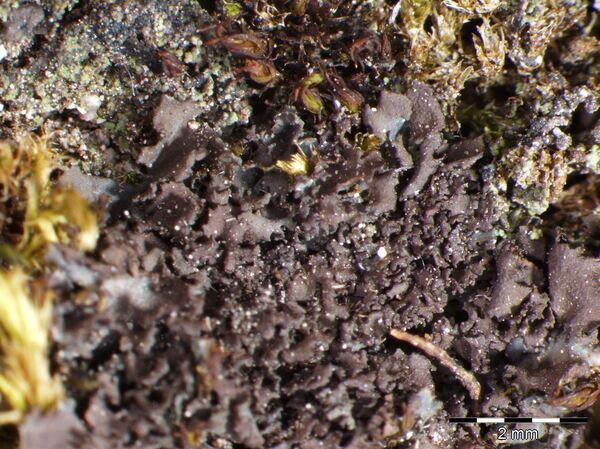
Harrie Sipman – Source http://www.bgbm.fu-berlin.de/sipman/Zschackia/AegeanLichens/CaloplacaAC.htm - As Caloplaca oasis
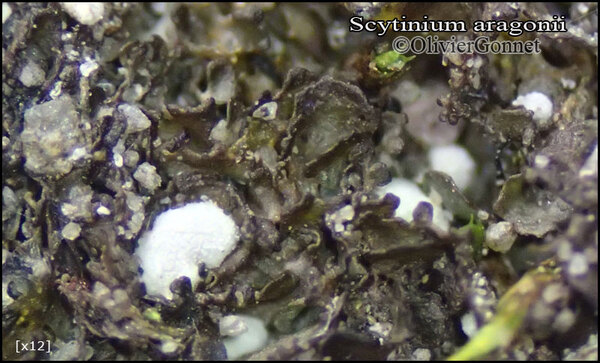
Courtesy Danièle et Olivier Gonnet - Source: https://www.afl-lichenologie.fr/Photos_AFL/Photos_AFL_S/Text_S/Scytinium_aragonii.htm
France, 14/9/2015 - Flaines, les grandes platières - Haute-Savoie
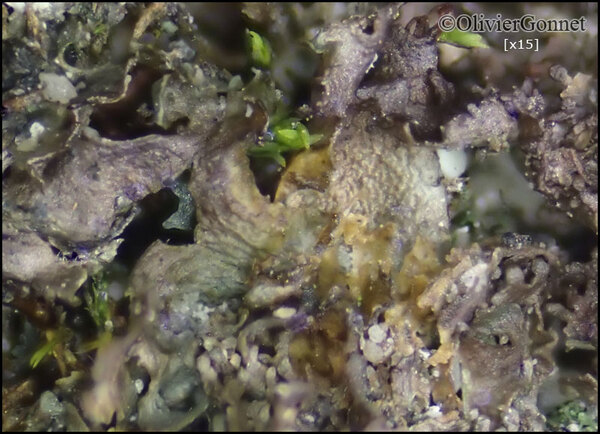
Courtesy Danièle et Olivier Gonnet - Source: https://www.afl-lichenologie.fr/Photos_AFL/Photos_AFL_S/Text_S/Scytinium_aragonii.htm
France, 14/9/2015 - Flaines, les grandes platières - Haute-Savoie
Growth form: Squamulose
Substrata: soil, terricolous mosses, and plant debris
Photobiont: cyanobacteria, filamentous (e.g. Nostoc, Scytonema)
Reproductive strategy: mainly sexual
Commonnes-rarity: (info)
Alpine belt: absent
Subalpine belt: absent
Oromediterranean belt: absent
Montane belt: very rare
Submediterranean belt: rare
Padanian area: absent
Humid submediterranean belt: rather common
Humid mediterranean belt: rather rare
Dry mediterranean belt: extremely rare

Predictive model
| Herbarium samples |

Harrie Sipman – Source http://www.bgbm.fu-berlin.de/sipman/Zschackia/AegeanLichens/CaloplacaAC.htm - As Caloplaca oasis

Courtesy Danièle et Olivier Gonnet - Source: https://www.afl-lichenologie.fr/Photos_AFL/Photos_AFL_S/Text_S/Scytinium_aragonii.htm
France, 14/9/2015 - Flaines, les grandes platières - Haute-Savoie

 INDEX FUNGORUM
INDEX FUNGORUM
 GBIF
GBIF
 DOLICHENS
DOLICHENS
